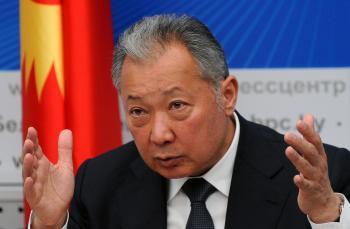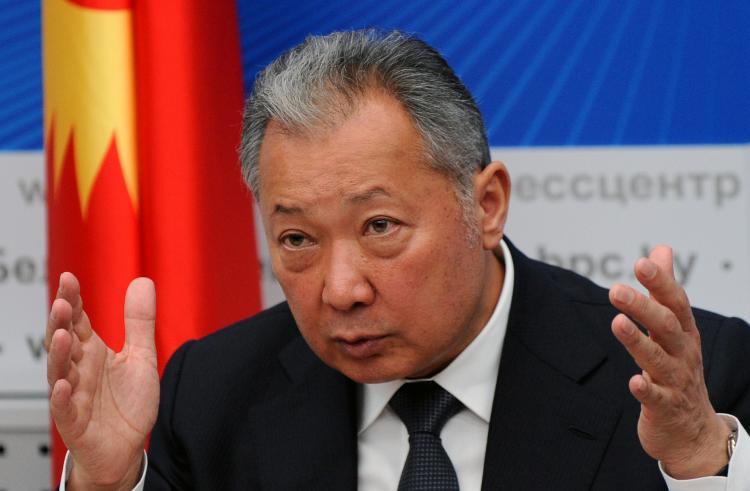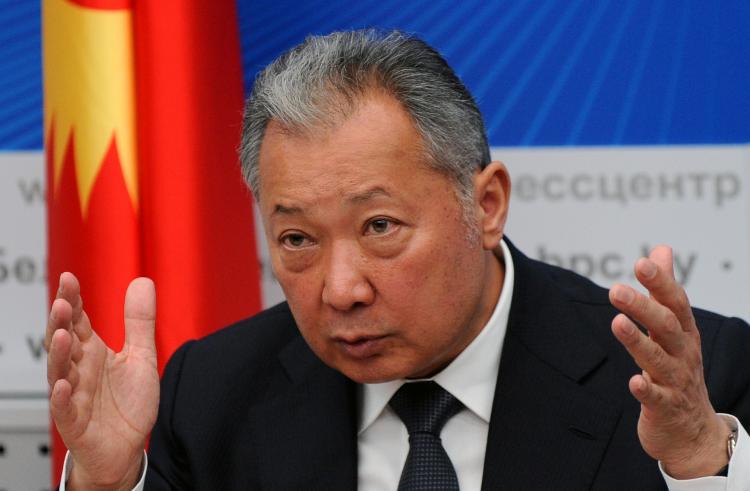Several hundred supporters of deposed Kyrgyz President Kurmanbek Bakiyev grabbed administrative posts in the southern region of Kyrgyzstan on Thursday in an effort to retake control of the country only a month after a prior coup.
The actions may throw the legitimacy of the tentative government into disarray. The self-declared government was formed after a coup early last month that left 85 protesters dead and over 1,000 injured. Kurmanbek Bakiyev was exiled to Belarus.
On Thursday, Bakiyev’s supporters took control of regional administrations in the southern cities of Osh, Jalalabad, and Batken and demanded the fired governors be reinstated to their previous positions.
Jalalabad region’s governor was caught by the protesters and was driven away, according a Reuters report.
On Wednesday, Bakiyev’s supporters held demonstrations in the capital of Bishkek and the southern city of Osh, condemning the new government’s policies.
The new government said that it was negotiating the issue with opponents and would not use force to calm down the uprising.
Bakiyev fled the capital Bishkek to his native southern region on April 7, when he agreed to step down and left for neighboring Kazakhstan. Finally, he settled down in Belarus.
The Kyrgyz authorities formally requested Belarus President Alexander Lukashenko to extradite Bakiyev back to the impoverished Central Asia clan-ruled country, as they held Bakiyev accountable for the protesters’ deaths.
However, Lukashenko refused to hand Bakiyev back to the new Kyrgyz government.
Russian President Dmitry Medvedev appointed on Thursday his special representative to Bishkek to regulate and develop bilateral relationships.
Meanwhile, Belarus officials recalled their ambassador to Kyrgyzstan and other diplomats as they feared that the protests demanding Bakiyev’s extradition could threaten them.
Bakiyev, who came to power himself in the Tulip Revolution in 2005, had promised democratic developments, but was condemned by many for soaring utility prices, imposing media restrictions, and concentrating power into his own hands.
The current development is unsettling for the new government, which is hoping to legitimize its power. It sought to hold presidential elections in the fall and has said that it would reform the constitution in June.
The international community has not yet recognized the self-declared government, but some have expressed support by delivering humanitarian and financial aid, including the United States, Russia, and China, key competitors for strategic energy resources and transit routes in the region.
The actions may throw the legitimacy of the tentative government into disarray. The self-declared government was formed after a coup early last month that left 85 protesters dead and over 1,000 injured. Kurmanbek Bakiyev was exiled to Belarus.
On Thursday, Bakiyev’s supporters took control of regional administrations in the southern cities of Osh, Jalalabad, and Batken and demanded the fired governors be reinstated to their previous positions.
Jalalabad region’s governor was caught by the protesters and was driven away, according a Reuters report.
On Wednesday, Bakiyev’s supporters held demonstrations in the capital of Bishkek and the southern city of Osh, condemning the new government’s policies.
The new government said that it was negotiating the issue with opponents and would not use force to calm down the uprising.
Bakiyev fled the capital Bishkek to his native southern region on April 7, when he agreed to step down and left for neighboring Kazakhstan. Finally, he settled down in Belarus.
The Kyrgyz authorities formally requested Belarus President Alexander Lukashenko to extradite Bakiyev back to the impoverished Central Asia clan-ruled country, as they held Bakiyev accountable for the protesters’ deaths.
However, Lukashenko refused to hand Bakiyev back to the new Kyrgyz government.
Russian President Dmitry Medvedev appointed on Thursday his special representative to Bishkek to regulate and develop bilateral relationships.
Meanwhile, Belarus officials recalled their ambassador to Kyrgyzstan and other diplomats as they feared that the protests demanding Bakiyev’s extradition could threaten them.
Bakiyev, who came to power himself in the Tulip Revolution in 2005, had promised democratic developments, but was condemned by many for soaring utility prices, imposing media restrictions, and concentrating power into his own hands.
The current development is unsettling for the new government, which is hoping to legitimize its power. It sought to hold presidential elections in the fall and has said that it would reform the constitution in June.
The international community has not yet recognized the self-declared government, but some have expressed support by delivering humanitarian and financial aid, including the United States, Russia, and China, key competitors for strategic energy resources and transit routes in the region.






